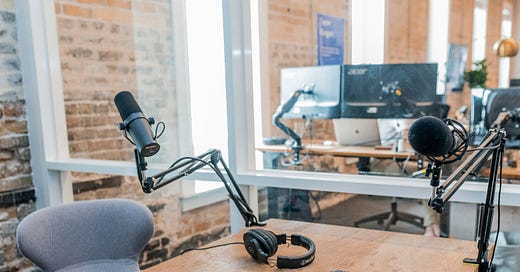10 Things to Know Before Starting Your First Podcast
I’ve seen what works—and what doesn’t—when it comes to creating engaging audio content.
Starting your first podcast is an exciting journey, but it’s not as simple as plugging in a microphone and hitting record. Over the years, I’ve learned that preparation, strategy, and a clear vision are essential to creating a podcast that resonates with listeners. With 15 years of experience producing morning radio shows and helping launch several successful podcasts, I’ve seen what works—and what doesn’t—when it comes to creating engaging audio content.
Here are 10 things you should know before starting your first podcast to set yourself up for success.
1. Know Your “Why”
Before you record a single word, ask yourself why you’re starting this podcast. Are you looking to educate, entertain, or inspire? Build your brand? Create a community? Your purpose will guide every decision you make, from content and format to marketing and promotion.
Pro Tip: Write down your podcast’s mission statement and revisit it regularly to stay focused.
2. Define Your Audience
Your podcast isn’t for everyone, and that’s okay. Identifying your target audience allows you to tailor your content to their needs, interests, and preferences.
Ask Yourself:
Who will benefit most from my podcast?
What challenges, questions, or interests do they have?
When you know who you’re speaking to, it’s easier to create content that resonates.
3. Choose a Clear, Sustainable Topic
Your topic is the foundation of your podcast. It should be specific enough to attract a niche audience but broad enough to sustain multiple episodes.
Pro Tip: Brainstorm at least 20 potential episode ideas before committing to your topic. If you struggle to come up with ideas, the topic might not have enough depth for a podcast.
4. Decide on Your Format and Style
Podcasts come in all shapes and sizes, from solo commentary to interview-based shows and narrative storytelling. Choose a format that aligns with your strengths and your audience’s expectations.
Consider:
Episode length (short and snappy vs. in-depth deep dives).
Frequency (weekly, biweekly, or monthly).
Tone (formal, conversational, humorous).
Your format should complement your content and fit your schedule.
5. Invest in the Right Equipment
Good audio quality is non-negotiable for a podcast. Fortunately, you don’t need a Hollywood studio to achieve professional results.
Essentials for Beginners:
A quality microphone (e.g., USB microphones like the Blue Yeti or XLR options like the Shure SM58).
Headphones for monitoring.
Audio editing software (Audacity for free or Adobe Audition for more advanced editing).
A quiet recording space is just as important as good equipment. Eliminate background noise and echoes as much as possible.
6. Plan, but Stay Flexible
Preparation is key, but you don’t need to script every word. Striking a balance between structure and spontaneity keeps your podcast engaging and authentic.
Tips for Planning:
Create a detailed outline for each episode, including key points and transitions.
Have a backup plan for technical glitches or no-show guests.
Remember, it’s okay to adapt your plan as you go—especially if your audience offers feedback.
7. Be Consistent
Consistency builds trust and loyalty with your audience. Whether you release episodes weekly, biweekly, or monthly, stick to a schedule so your listeners know when to expect new content.
Pro Tip: Batch record episodes before launching to ensure you have a buffer in case life gets busy.
8. Focus on Promotion from Day One
Creating a podcast is just the first step; promoting it is how you’ll grow your audience. Start marketing your show before your first episode drops.
Ideas for Promotion:
Tease your podcast on social media with trailers and behind-the-scenes content.
Leverage your existing network to spread the word.
Submit your podcast to all major directories (Apple Podcasts, Spotify, Google Podcasts, etc.).
Don’t just rely on organic growth—be proactive in getting your podcast out there.
9. Measure Success Beyond Downloads
While download numbers are important, they’re not the only way to gauge your podcast’s success.
Other Metrics to Track:
Listener engagement (comments, reviews, social media interactions).
Retention rates (how long people are listening).
Audience growth over time.
Set realistic goals based on your podcast’s purpose and celebrate milestones along the way.
10. Be Patient and Persistent
Podcasting is a marathon, not a sprint. Growth takes time, and your first few episodes might not be perfect—but that’s okay. Focus on improving with each episode, listening to feedback, and staying committed to your vision.
Pro Tip: Most podcasts don’t take off overnight. Stay consistent, and your audience will grow as you refine your craft.
Starting your first podcast is an exciting journey, but it’s also a commitment. By knowing your purpose, understanding your audience, and preparing thoughtfully, you can create a show that stands out and builds a loyal following.
Remember, I’ve spent 15 years producing morning radio shows and helping launch new podcasts, and if there’s one thing I’ve learned, it’s this: authenticity and passion always resonate. So, take a deep breath, grab that mic, and start creating. Your audience is out there waiting to hear your voice.





NICELY done! Gonna link to this article from my website's page on starting a podcast.